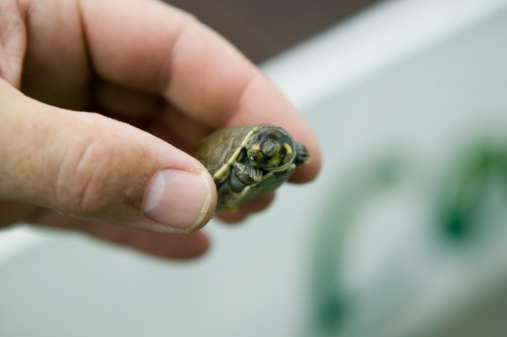An outbreak of thirty-seven Salmonella cases reported in 13 states since May has prompted a investigation by federal and state authorities. The outbreak has been linked to contact with pet turtles.

The outbreak strain has been identified as Salmonella Agbeni.
Of 33 people with available information, 16 have been hospitalized. No deaths have been reported. One third of the cases are children 5 years of age or younger.
The Centers for Disease Control and Prevention (CDC) advises not to buy small turtles as pets or give them as gifts.
Since 1975, the FDA has banned selling and distributing turtles with shells less than 4 inches long as pets because they are often linked to Salmonella infections, especially in young children.
All turtles, regardless of size, can carry Salmonella bacteria even if they look healthy and clean. These outbreaks are a reminder to follow simple steps to enjoy pet reptiles and keep your family healthy.
Salmonella can cause serious and sometimes fatal infections in young children, frail or elderly people, and others with weakened immune systems. Healthy persons infected with Salmonella often experience fever, diarrhea (which may be bloody), nausea, vomiting and abdominal pain.
In rare circumstances, infection with Salmonella can result in the organism getting into the bloodstream and producing more severe illnesses such as arterial infections (i.e., infected aneurysms), endocarditis and arthritis.
Related:
- Houston floods: What are the infectious disease risks?
- Nurses’ scrubs: Antimicrobial fabrics are ineffective for preventing bacterial contamination
- Psoriasis severity linked to increased risk of death: Penn study
- Philippines: No human bird flu cases so far, Duterte dines on Pampanga poultry
- Human West Nile Virus reported in Niagara
- Vaccinia Virus Vaccine (Live) seized after being used inappropriately in vulnerable cancer patients
- Melioidosis in Thailand: Nearly 2,000 cases reported this year
- Barracuda the source of Belize ciguatera cases


